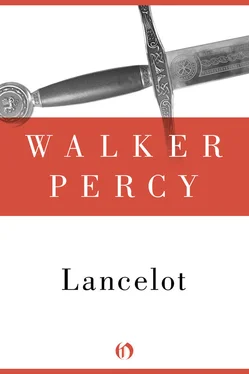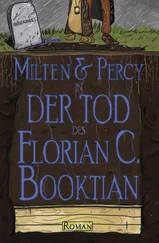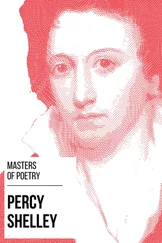Do you remember my mother? I never thought of her as “beautiful” or “good-looking” but rather as too pale, with wide winged unplucked eyebrows which gave her a boy’s look. You thought she was beautiful? Perhaps I don’t remember her after she began to drink. Later she became sly and even a little voluptuous. After years of secret drinking, there came to be a tightness and glossiness about her face. Her chin receded a little. Her eyes became brilliant and opaque and mischievous as if she knew a joke on everybody. You know, I’ve since known several genteel lady drunks who develop this same glossy chinless look. Is that a facial syndrome of woman alcoholics? Or a certain kind of unhappy Southern lady? Or both?
I remember her earlier not as “beautiful” but as thin-boned, quick, and sporty. There was a kind of nervous joking aggressiveness about her. She liked to “get” me. On cold mornings when everyone was solemn and depressed about getting up and going off to work or school, she would say, “I’m going to get you,” and come at me with her sharp little fist boring away into my ribs. There was something past joking, an insistence, about the boring. She wouldn’t stop.
Uncle Harry, jovial Schenley salesman and third cousin once removed, family friend and benefactor who brought me presents — even presents on ordinary weekdays, imagine a glass pistol loaded with candy on an ordinary Tuesday afternoon or a Swiss army knife with twenty-two blades — who was not only nice to me but took Lily, who was delicate then and had to rest a lot, for “joyrides” to False River—“Get her out of the house, Harry!” my father said — leaving him, my father, to his beloved quiet. Once he, my father, painted a mystical painting of our alley of live oaks showing the perpetual twilight filling them even at noon, and above, great domed spaces shot through by a single stray shaft of sunlight, a picture he entitled “O sola beatitudo! O beata solitudo!” He wrote a poem with the same title. Poet Laureate he was of Feliciana Parish, so designated by the local Kiwanis, lying on his recliner on the deep shaded upper gallery dreaming over his history manuscript, dreaming not so much of a real past as what ought to have been and should be now and might be yet: a lovely golden sunlit Louisiana of bayous and live oaks and misty green savannahs, Feliciana, a happy land of decent folk and droll folkways and quiet backwaters, the whole suffused by gentle Episcopal rectitude.
Uncle Harry then and Lily entering a tourist cabin on False River of a sunny wintry afternoon, the frost-bleached levee outside, the raw soughing gas heat striking at leg and eyes, the gracious cold still trapped in Lily’s fur, the sheets slick-cold and sour.
But now, in the pigeonnier and in the eye of the storm, the sense at last of coming close to it, the sweet secret of evil, the dread exhilaration, the sure slight heart-quickening sense of coming onto something, the dear darling heart of darkness — ah, this was where it was all right.
You always got it backward: you don’t set out looking for clues to God’s existence, nobody’s ever found anything that way, least of all God. From the beginning you and I were different. You were obsessed with God. I was obsessed with — what? dusky new graygreen money under interwoven argyle socks? Uncle Harry and Lily in the linoleum-cold gas-heat-hot tourist cabin?
The rising moon grew brighter and smaller. The great bastion of cloud wheeled slowly. Andes peaks and mesas and glaciers revolved slowly past my window. My mouth was open. I became aware of a difficulty in breathing as if I had asthma. I don’t have asthma. I looked at my Abercrombie & Fitch desk weatherstation, Christmas present from Margot. The barometer read 28.96. I went to the open door. Children and youths in their teens were playing in the bright moonlight on the levee. They were exhilarated by the stillness of the great wheeling storm. Some worked seriously on the bonfires, adding willow logs and rubber tires to make smoke. Some somersaulted or lay flat and rolled down the levee. A young girl in a long white dress danced alone a French version of the square dance, a Fais do-do, mincing forward and backward, holding her head first to one side then to the other, curtsying, her hands spreading wide the folds of her skirt. Their cries came to me through the thin dead air, muffled and faraway. I became aware that it was the girl’s voice. She was singing. Her voice carried in the hushed air. It was an old Cajun tune I used to hear at Breaux Bridge.
Mouton, mouton — et où vas tu?
A l’abatoire .
Quand tu reviens?
Jamais — Baa!
That was curious. There were no Cajun families here on the English Coast, only a few light-colored Negroes with French names, whom we called freejacks because they were said to have been freed by General Jackson for services rendered in the Battle of New Orleans.
Where did she come from?
In 1862 my great-great-grandfather Manson Maury Lamar, infantry captain with the 14 thVirginia, struck up the Shenandoah Valley in A. P. Hill’s corps, which invested Harper’s Ferry, took thirteen thousand prisoners, got news of McClellan’s assault on Lee at Sharpsburg seventeen miles away, hit a jog for the seventeen miles, and arrived just as Lee’s right was giving way, took his company into battle at a dead run. It was the bloodiest day of the war. He would never talk about it, they said. But he would also never talk about anything else. He said nothing. My uncle fought in the Argonne. He said it was too horrible. But he also said he never again felt real for the next forty years.
My son refused to go to Vietnam, went underground instead in New Orleans, lived in an old streetcar, wrote poetry, and made various sorts of love. Was he right, or was I right, or are you right?
I went to see Anna this morning. We spoke. She sat in a chair. She’s going to be all right. She speaks slowly and in a monotone, choosing her words carefully like someone recovering from a stroke. But she’s going to be all right. She had combed her hair and wore a skirt and sat on her foot and pulled her skirt over her knee like a proper Georgia girl. I told her I would be leaving the hospital soon and asked her to come with me.
“Where are you going?”
“I don’t know.”
“I see.”
After a while she said: “And you want me to come with you.”
“Yes.”
“Why?”
“Isn’t that enough? I want you to come with me.”
“Do you love me?”
“I’m not sure what that means. But I need you and you need me. I will have Siobhan with me.”
“I see.” She seemed to know all about Siobhan. Did you tell her? She nodded. “A new family. A new life.”
That’s all she said. She kept on nodding. But I wasn’t sure she was listening. Do you think she meant she would come?
Do you hear the sound of music faraway? No? Perhaps I only imagined it, no doubt it is the echo of a dream or rather a vision which has come to me of late. But I swear I could hear the sound of young men marching and singing, a joyful cadenced marching song. A Mardi Gras marching band over on St. Charles? No. You’re right, it’s November, nowhere near Mardi Gras. Besides, it wasn’t like a high-school band. It was young men singing and marching. It was both a great deal more serious and joyful than a high-school band.
Anna got bad news today. Her father died of a heart attack. Now she like me is alone in the world. He left her nothing but a cabin and a barn and fifty acres in the Blue Ridge not far from Lexington, Virginia. Well, that settles it. No Big Sur after all and perhaps it’s just as well. In fact it is a kind of sign. It is Virginia where we’re supposed to be. I see that clearly now.
Читать дальше












